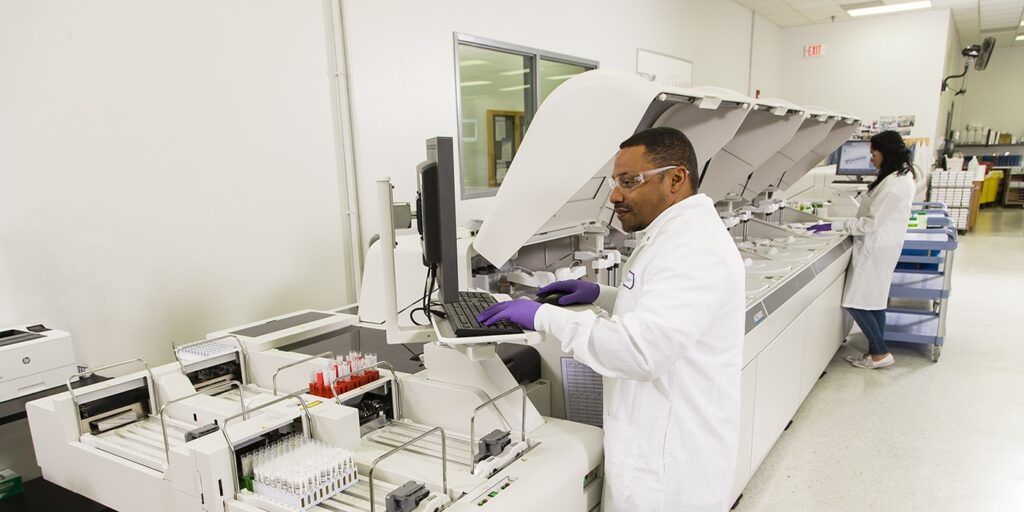How does Clinical Biochemistry Work?
According to Wikipedia, clinical biochemistry is the division of laboratory medicine that concerned with the measurement and analysis of chemicals (both natural and unnatural) in blood, urine and other body fluids. These test results are useful for detecting health problems, determining prognosis and guiding the therapy of a patient.
Clinical Laboratory Reagent Water in Clinical Biochemistry Application
In clinical or biochemical laboratory, whether you are setting up a new water system or if you’re checking the current quality of water system, you will need to have a basic understanding of Clinical and Laboratory Standards Institute (CLSI) standards and guidelines for Clinical Laboratory Reagent Water (CLRW).
Who is CLSI?
In the global scope, CLSI promotes the development and use of voluntary laboratory consensus standards and guidelines within the health care community, it has been a key reference for water purity in clinical laboratories.
Why it is Important to Follow Such Strict Water Quality Standard During Clinical Testing Procedures?
The goal of every clinical laboratory is to produce accurate results. However, there are many factors determine the accuracy of the final result.
Water quality is a major component of many reagents, buffers, and diluents used in clinical laboratory testings. It is also an indirect factor of test results when it is used for washing and sanitizing instruments and laboratory ware etc. Adequate control of contamination in purified water used in clinical procedures will reduce potential cause of laboratory error. Organizations such as CLSI, ASTM International (American Society for Testing and Materials) officially released water quality standards and guidelines, but the ultimate responsibility for implementation and adherence is in the hand of the researchers.
Role of Water in Clinical Application
There are number of types of purified water for use in clinical laboratory testing procedures are specified by CLSI:
- Clinical Laboratory Reagent Water(CLRW): alike ASTM Type I,II for most applications
- Special Reagent Water (SRW): may be specified for specific applications when additional parameter are needed to insure water quality than CLRW. Application could be immunoassay, molecular assays, HPLC, LC-MS, GC, Microarray, IVF
- Instrument Feed Water (IFW): as its name implies, it can be used as feeding water to different lab system, or can be used for autoclaving, filling water baths and washing glassware. It must meet the instrument manufacturer’s specifications, which may be more rigorous to ensure accurate and reproducible results.
- Water supplied by a method manufacturer: for use as a diluent or reagent, not as a substitute for CLRW
- Autoclave and wash water: meet the requirement of application similar to ASTM Type III water
- Commercially bottled, purified water: water suitability needs to be checked
More than Just H2O
“Water is a normal constituent of Earth’s hydrosphere and the fluids of all known living organisms.”
– from Wikipedia
It consists of more than just its chemical formula of H2O, the extra substances are considered to be contaminated when it is used as Clinical Laboratory Reagent Water. The contaminants can be broadly separated into inorganic and organic substances for Clinical Laboratory Reagent Water.
Types of Inorganic Contaminants
Inorganic substances include gases and ions dissolved in water, and other non-soluble particulate and colloids, which affect experimentation in several ways. Non-dissolved particles can clog micro- and even nano-sized pipes and filter channels in sensitive lab equipment. On the other hand, these contaminants might actively react or change PH of sample mix to affect testing results.
Types of Organic Contaminants
Organic substances, also known as total organic carbon (TOC) measures the amount of organic carbon that is found in water. The contaminants include biological material, bacterial growth or the chemical activity of living organisms such as bacteria and their various waste such as endotoxins, enzymes, and nucleases. These organic substances particularly are impactful on chromatographic assays like HPLC, LC-MS.
Purification Technologies Basics
Water will be purified to achieve certain purification for laboratory use. There are many different technologies nowadays to create lab water from potable water supply system, which uses combination with each other. The technology is suited for your laboratory needs depends on the application it is required for, the grade of water needed, of course costs are another factor to be considered.
- Reverse Osmosis
- Deionization: EDI
- Ultraviolet
- Micro-filtration
How Unicorn Solve Water Purity Problems for Clinical Biochemistry
With over decades of experience in this field, Unicorn’s expertise and experience ensure its advanced water purification solution can help you to get the right level of water quality for your designated application.


